Thursday, July 28, 2011
Late Night Rant: On the subject of Movie Adaptions
So it bugs me when people start judging the movie before it even comes out, just because it’s an adaption.
And it really, really bugs me when their reason for this is, “The actors/setting/costume design is nothing like I imagined.”
You know why this frustrates me? Because it is an unreasonable expectation to have, and it’s not a fair standard to set. Even if the cast and crew of a movie could read viewer’s mind, there is no way that any one movie could match the imagination of every reader.
More than that, I hate this because it completely misses the point.
You don’t want the movie to match your imagination.
What you want is for the movie to give you something more, something beyond the original story, something that lives up to the heart of the characters you love and stories you adore while still bringing something new to table.
That, ladies and gentlemen, is a successful movie adaption.
Movie adaptions are not meant to replace the book. Most – the mediocre ones, the ones churned out with no passion just to make a buck – are simply an excuse to extend your enjoyment of the story you love and share that enjoyment with your fellow fans, just like anime conventions, fan fiction, cosplay, and internet forums. Even the bad ones, the “Batman and Robin”s, are, at worst, a testament to why the original story was so great.
But the best movie adaptions take the story and turn it into something more.
Lord of the Rings became a cinematic masterpiece and cultural experience that brought epic fantasy into the mainstream consciousness of America.
Harry Potter was turned into one of the most ambitious projects in the history of cinema, keeping the same cast and same ongoing story through ten years, eight movies, and the horrors of puberty without ever sacrificing their standard.
And Marvel’s superhero movies of the last few years – like Iron Man, Thor, and Captain America – have brought comic book-style continuity to the big screen for the first time, opening movies to the kind of rich, expansive world-building that is exactly what makes superheroes so unbelievably epic.
These are all extreme examples, of course, but my point remains: a good adaption will always give you more than you could have imagined, and those that do are worth the dozens of “Just okay”s and even the occasional stinkers.
Besides, if all the movie adaption had to offer you was the exact same thing you could imagine for yourself, there would be no point in creating a movie adaption at all.
Wednesday, July 27, 2011
Suggestions for the VN Newbie
Otome Dating Sims (Girl pursues Boy)
RE: Alistair++ (Sakevisual) – A full FREE game available at Sakevisual’s website. I’ll be doing a belated review of it later this week, because it is pretty much the standard that I judge dating simulations by. And it’s free. Why are you not downloading it now?
Always Remember Me (Winter Wolves and Otome Games) – Easily Winter Wolves’ best game, Always Remember Me is a stat-based otome and life simulation game that, like other Winter Wolves games, has an excellent mechanics system and beautiful execution. It’s available on their website for $19.99
X-Note (Zeiva Inc. and Otome X) – A mystery wrapped up in a dating sim, following the main character as she investigates the death of her mother. Reviewed by me here, and available here for $15.
Dating Sims (Boy pursues Girl)
Katawa Shoujo (Four Leaf Studios) – A free, high-quality episodic game with beautiful art, a creative story, and very appealing characters. It is, however, wordy as fuck and the interaction between player and game is minimal. Still, it is a very strong story and is worth checking out. Available for free here.
The Flower Shop (Winter Wolves) – I think this is the game that people associate with Winter Wolves more than any other. It sets the WW standard for excellent mechanics and professional game production. Available here for $15.
Mystery Games
Jisei and Kansei (Sakevisual) – Easily my favorite series, period, and you can expect a full review as soon as I get my hands on Kansei. In both games, you take control of a mysterious, nameless protagonist to solve murder mysteries with his ability to see a victim’s last moments. Available here for $15 each.
9 Persons, 9 Hours, 9 Doors (Chunsoft, published by Aksys games) for the Nintendo DS – If you own a DS and will only ever play one visual novel, let me tell you – PLAY THIS ONE. There is so much to love. My full review is here. Available for $29.99 on Amazon.
The Ace Attorney series (Capcom) for the Nintendo DS – Pretty much the ur-example of English language VN releases and probably the most icon non-dating-sim VN available on the English market. Available for about the same price as most DS games, ie, about $20-$50 depending on where you buy it.
Answering the Question: What is a Visual Novel?
So here’s a quick primer.
Visual Novels, also known as VNs, are a prevalent form of Japanese interactive fiction game. They’re very popular in Japan, making up 70% of all PC games released in 2006, but have only a small following in the Western world.
For us English-speakers, the most well-known kind of visual is what’s known as a Dating Simulation game. It’s pretty much exactly what it sounds like. The player takes the role of a character, usually a young man, in a situation where he’s surrounded by several attractive young women. The player then chooses to pursue one of the non-player characters for a romantic storyline, usually cumulating with a “good ending” of marriage or at least winning a date.
There is also a variation of dating sim known as an otome or “princess” game, which is same situation with a female player character pursuing male NPCs. Interestingly, a majority of the high-quality original English language VNs are otome games. There are some homosexual dating sims out there, but they tend to be a minority.
And, of course, there are the hentai games, which are porn. Most are pretty much the same as a dating sim, except that the goal is to get into the girl’s pants.
A less-prominent but still significant genre of visual novels is the mystery game. These are story-heavy mystery games that lead the player to unravel various secrets, sometimes in a way that’s similar to a puzzle or point-and-click action adventure.
No matter the genre, visual novels are a great storytelling medium that combines text, art, and music to communicate interactive stories with multiple endings.
How to Play
The in-game screens usually look something like this:
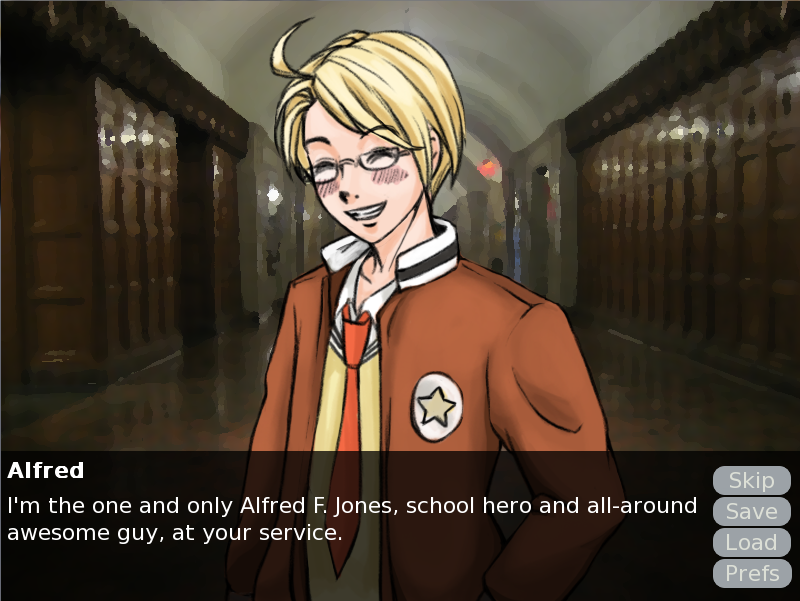 There are three basic elements. First is the text box, where the narration and dialogue describes the story. Second is the character, in the form of a static sprite that represent the character you’re talking to at that moment. The third is the background.
There are three basic elements. First is the text box, where the narration and dialogue describes the story. Second is the character, in the form of a static sprite that represent the character you’re talking to at that moment. The third is the background.Generally, as a scene plays out, the background will stay the same (establishing the location), while the character sprites switch between emotions and text box scrolls through the story. Eventually, in most games, choices will appear, like this:
 These choices can be anything from things to say (like in this example) to major actions (ie, choosing which of three characters is the real murderer).
These choices can be anything from things to say (like in this example) to major actions (ie, choosing which of three characters is the real murderer).The most basic visual novels act essential like choose-your-own adventure books, which each decision branches off into a new part of the story. More complicated games will utilize stat-raising elements based on decisions, and it can be tricky to tie the mechanics into the storytelling, but if you pull it off as a creator, it can be very rewarding.
Writing Visual Novels
Just a short blip on this subject: all English visual novels, at least those that are originally created in English, are created by independent, small-time organizations and individuals. Thus, it is very easy to make your own game with a little time and effort. I dabble it myself. In fact, those screen shots up there are from a basic Hetalia Axis Powers fan-game I made to teach myself the system.
Some VN creators use Flash to create their games, but I think the most effective way is to utilize the python-based Ren’py visual novel engine, available for free here. Not only is Ren’py fun to learn and pretty easy to use, once you master it you can create really complicated and professional-level games. Plus, they’ve got a growing community of creators and visual novel fans that can be a lot of fun to hang out with.
If you ever happen to be at a con with Ayu Sakata of Sakevisual, definitely go to her visual novel panel, because she does a great job of explaining how to create them. Also, she's funny.
If all this has gotten you interested in playing visual novels, then great! My next post will have a list of my favorite suggestions for VN newbies, including several free games. It's coming up in just a little bit so stay tuned.
Monday, July 25, 2011
Debut YA Author Review: Divergent by Veronica Roth

All year long, I've been reading the new and debut YA releases, looking for a book that would get me genuinely excited again. For seven months, I was disappointed. And then I found DIVERGENT.
Oh my god. I love this book.
The story goes like this: in Beatrice Prior's future Chicago, the population is divided into five factions, each built around a different virtue. These are Candor (the honest), Dauntless (the brave), Abnegation (the selfless), Erudite (the intelligent), and Amity (the peaceful). At age sixteen, everyone must choose which faction they'll belong to for the rest of their lives. For Beatrice, the choice is whether to stay with her family or be who she really is - she can't have both. So she makes a decision that shocks even herself.
There are so many good things to say about it. The world-building is amazing, the plotting is both intricate and riveting, the characters and their conflicts are sympathetic, and the deaths - when they happen - are absolutely heart-breaking. The themes - about destiny, free will, selflessness and courage - are well-established and really hit home, and the writing, while not exactly lyrical, has a strong voice and is very engaging.
(I would, however, like to point out that Tris's society is actually not a dystopia. It's an unusual and creative form of government full of flaws and moral gray areas, but it's neither repressive nor draconian; at least, no more so than any modern society. Each faction governs its members in its own way and, from what we get to see, only the Erudite really fall under the definition of dystopia. It is, however, hinted to be post-apocalyptic, and I'm interested to see what the world is like outside of the inclusive Chicago area.)
Still, everyone else has sung this book's well-deserved praises left and right, so there's much that I can really add, except for this: I love the opening scene.
See, Divergent is a very action-packed book. There's a lot going on, a lot of characters to juggle, a lot of fights to get into, and a lot of world to establish; still, it opens with a slow, emotional scene of Beatrice, our narrator, looking at her reflection and allowing her mother to brush her hair.
This simple scene - which, like the rest of the book, is beautifully written - establishes the character of Beatrice, her relationship to her mother, and her connection to the Abnegation faction, all in a beautiful, calm, and emotional way. These three things are vital to the overall theme of the book, and the opening scene does a wonderful job of bringing us right into Beatrice's heart and her world before we even step out of her house.
And that's the heart of the matter really. Divergent is not just another copycat dystopia trying to capitalize on the Hunger Games and Uglies popularity. Ms. Roth understands that a good high-concept story still needs a strong grounding in the heart of our main character,and that's exactly what Divergent gives you, from beginning to end.
Seriously guys, do not miss this book.
Saturday, July 9, 2011
Visual Novel Review: X-Note
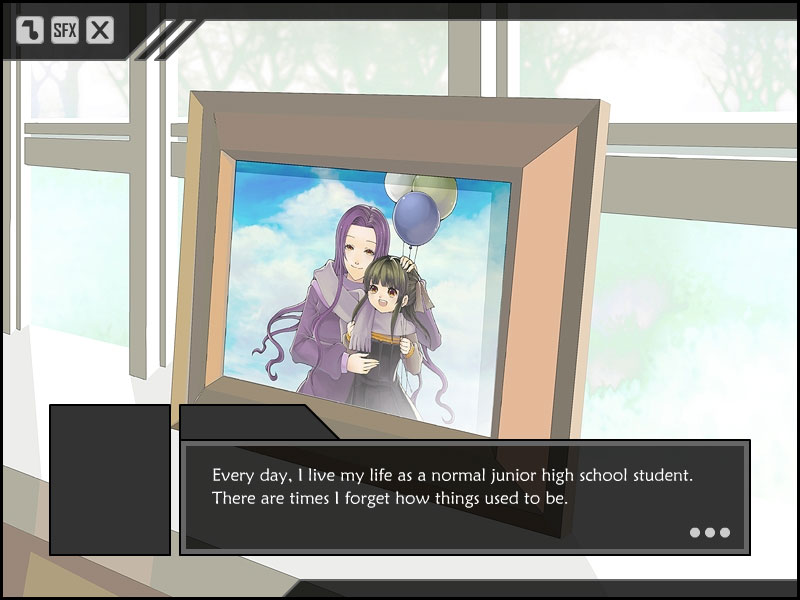 Ten years ago, Essi’s mother died in a questionable accident, leaving behind only a USB with a locked folder called “X-Note.” Essi, now a teenage psychic, is brought to Xen Institute to investigate a murder case and a mysterious disapearance that have a deep relation with the death of Essi’s mother. But what she finds there is more than she could have possibly expected.
Ten years ago, Essi’s mother died in a questionable accident, leaving behind only a USB with a locked folder called “X-Note.” Essi, now a teenage psychic, is brought to Xen Institute to investigate a murder case and a mysterious disapearance that have a deep relation with the death of Essi’s mother. But what she finds there is more than she could have possibly expected.That is the story of “X-Note,” a mystery/dating-sim visual novel from Zeiva Inc. Production and Otome X. I picked up this game out of curiosity when I passed by the creator’s table at A-Kon last month and, now that I’d unlocked all the paths, I’ve decided it’s time to share the love.
There are a lot of high notes in this game. For one thing, it totally delivers on the rather substantive claim that it marries mystery and dating simulation. Each storyline reveals a little more about the overall plot, while also delivering cohesive relationship arcs with each of the three boys.
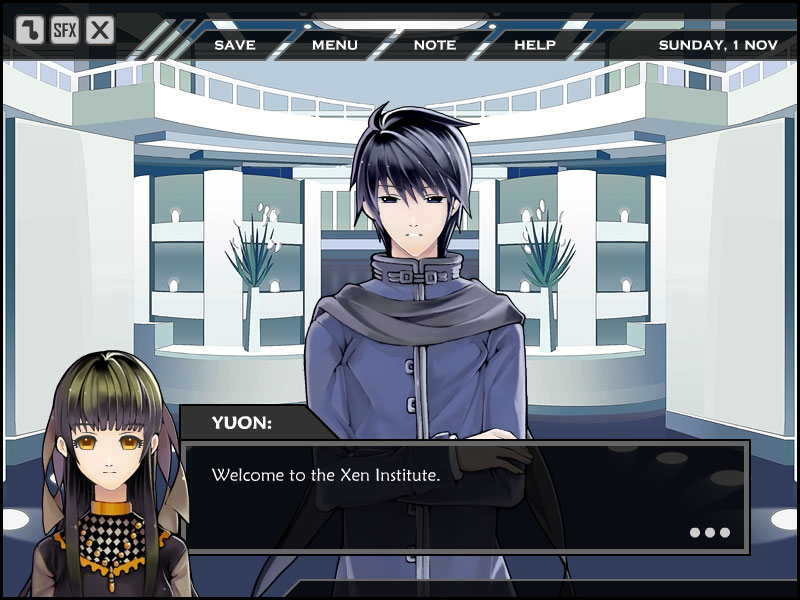 As for the boys, they’re all attractive in their own way. Oure is sweet and vulnerable, Yuon is serious but kind-hearted, and Anon is a playful trickster. They all have their hidden depths, and they all have a part to play in the overall mystery of the game, and the result is that, whichever guy you pursue, the overall story arc is satisfying. (And, I won’t deny it – at least two of the bad endings made me get teary-eyed.)
As for the boys, they’re all attractive in their own way. Oure is sweet and vulnerable, Yuon is serious but kind-hearted, and Anon is a playful trickster. They all have their hidden depths, and they all have a part to play in the overall mystery of the game, and the result is that, whichever guy you pursue, the overall story arc is satisfying. (And, I won’t deny it – at least two of the bad endings made me get teary-eyed.)Also, the art is beautiful, and it’s well-programed. There’s this unique thing in character design where all of the characters (except arguably Essi) are associated with a certain color. For example, Oure is white, Yuon is blue, and Anon is green. It gives an interesting air of stylization to the world that may, admittedly, be a bit hit-and-miss for some, but I liked it.
I was especially impressed because this is a flash-based novel, rather than the engine-driven ren’py games that I’m used to playing, so the designers had less to work with from the start, yet still manage to pull together a very well-made game.
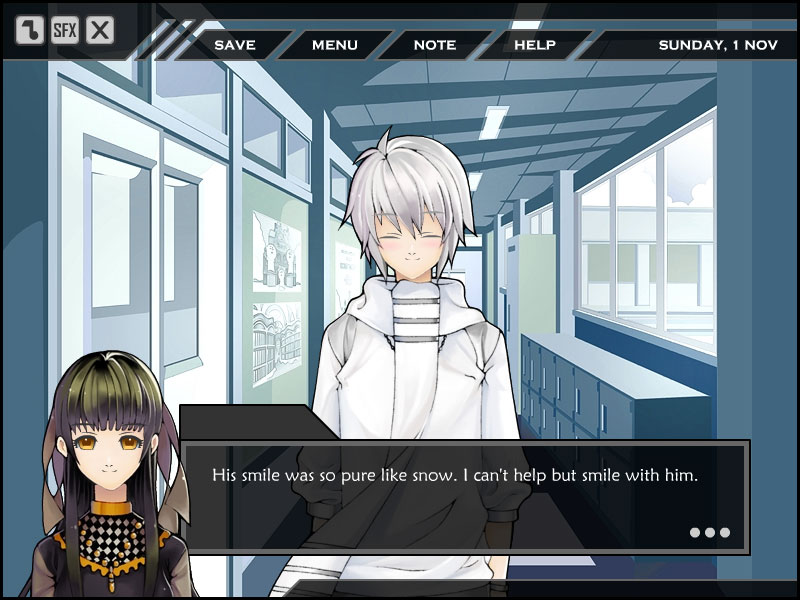
Then again, it’s far from perfect. English is not the creator’s first language, and there are times when it’s really obvious. And while I’m glad that the stat-raising aspect of the game has some real impact on overall gameplay, the exact way that they do that is seemingly arbitrary, which makes it hard to predict what will help you along your path and what will hinder.
On one hand, this does pretty much guarantee that you’ll unlock the bad endings before the good ones, which makes the story flow better; but on the other, it’s a little frustrating to have an end-game screen give you instructions for getting past the level you failed, and there were two times when the only way I could advance at all was to use the guide on the site.
And I’m not sure that I like how, when you don’t do the right thing to tell the game that you’re pursuing Oure or Anon, it automatically defaults to Yuon’s path. I started off the game pursuing Oure and not using the guide, so I wound up with the first three-fifths of Yuon’s path basically spoiled for me because it was getting in the way of the path I wanted to pursue.
But I suppose the thing that bothers me most of all is that none of the endings are completely satisfactory, which is to say, no matter which I get, there are always strings left hanging. The villain only gets anything resembling a come-uppance in one of the bad endings, the reason for the disappearance is never adequately resolved, and one character, who is built up as a mystery throughout the game, is simply not addressed. It’s rather frustrating.
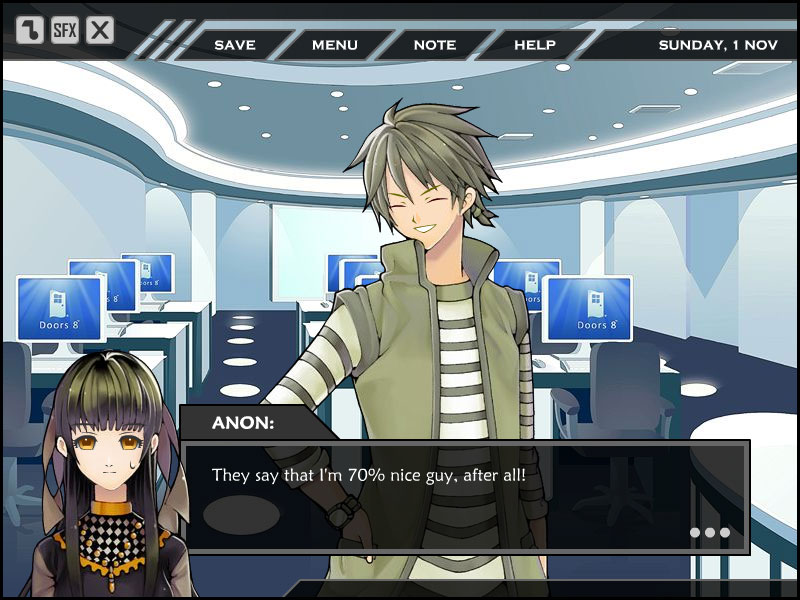 In addition, one ending reveals the ultimate fate of an important victim character and rescues him. Again, this is the only time that this aspect is ever addressed and – assuming that the backstory remains the same no matter what path you choose, which is standard – it leaves you wondering what happened to the mouse and takes away from the overall positive impact of the other endings.
In addition, one ending reveals the ultimate fate of an important victim character and rescues him. Again, this is the only time that this aspect is ever addressed and – assuming that the backstory remains the same no matter what path you choose, which is standard – it leaves you wondering what happened to the mouse and takes away from the overall positive impact of the other endings.In short, X-Note is fun. It’s intriguing, it’s unique, and I had a lot of fun while I was playing it. But once I was done, I was left ultimately unsatisfied by the overall experience, and I only wish that bit of storytelling had been patched up a bit before it was released.
You can find X-Note at the Zeiva Inc Website. All the images used in this review are also from that website, all rights reserved.